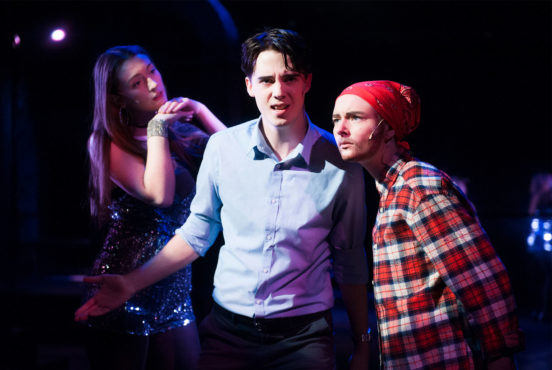Director Jeffrey Renn preaches importance of keeping art modern

Rachel Myers, Brendan Elwell, and Emma Grabinsky in the Phoenix’s latest production, Comedy of Errors. Photo by David Lowes via the Phoenix Theatre
It’s a conundrum that is almost as old as the Bard of Avon himself — how do you adapt Shakespeare to make it appealing to new generations?
This is the task that Master of Fine Arts candidate Jeffrey Renn has taken on by directing the Phoenix Theatre’s production of Comedy of Errors.
Comedy of Errors is a Shakespeare play based on Menaechmi, a comedy by the Roman playwright Plautus, who himself borrowed from Greek myths. The story revolves around two sets of twins — one pair of merchants and one pair of servants — who are lost at birth and reconnect in the play.
It truly is a classic — both in how much people love the play and how important it is within Shakespeare’s canon. The shortest of his plays and (Renn says) the funniest, it introduces plenty of themes into the bard’s work.
“There’s more mention of witches than Macbeth, there’s more mention of fairy creatures than Midsummer’s Night Dream, and there’s more mention of otherworldliness than the Tempest,” Renn tells me over the phone. “And you see, in this play, sort of you can see the seeds of everything that Shakespeare is going to explore for the rest of his career. Yet he does it inside of a farce!”
“I’m a zealot in the Church of the Theatre,” Renn confesses. “The theatre is my church. And so I want to proselytize and bring some souls over to my church.”
It would seem that directing a play isn’t enough of a challenge for Renn, who has another goal in mind — making this play accessible for a younger generation of theatre-goers.
“The Phoenix audience is advanced. They’re mostly retired university professors, and they are of an age,” Renn says, leaving me to fill in the euphemism. “I think anybody who’s over 30 that’s coming to the theatre — they’re gonna keep coming to the theatre. People between 15 and 30, this might be our only shot at convincing them that theatre has something to offer.”
“I’m a zealot in the Church of the Theatre,” Renn confesses. “The theatre is my church. And so I want to proselytize and bring some souls over to my church.”
For Renn, that means modernizing the play through music.
The Phoenix’s Comedy of Errors sees Shakespeare’s writing intermixed with the lyrics of several popular songs from artists like Queen, Imagine Dragons, Beyonce, and Rag’n’Bone Man. Taking inspiration from music videos, the visuals that accompany the mash-ups are bold and electronic. (Renn acknowledges the fantastic student work done by Matt Wilkerson and Aidan Dunsmuir in creating the lights and music, respectively.)
“Music has always spoken to youth,” Renn says, noting that he often gets his 17- and 22-year-old kids to “decode” modern pop music. “There’s a vocabulary inside of music that is unique to youth culture in itself.”
“The play is about youth, and the take that we’re doing on the play, the framing that we’re doing, is about this generation,” Renn tells me. And, with that in mind, it makes total sense for university students to be acting and producing.
Chantal Gallant is one of those student actors, playing the part of American Dromio. Speaking via Facebook Messenger (only appropriate, given the play’s modernization), she calls the remix of the play fun and refreshing.
“Contemporary adaptations are common (and, in my opinion, necessary) with Shakespeare, but this adaptation is unlike anything I’ve ever done before,” she writes. “It’s easy to get locked in on what Shakespeare should be rather than what it can be.”
In this case, Comedy of Errors can be so much. It contains universal questions about self-identity and self-exploration — the same questions that theatre itself asks, Renn says —and allows a new generation of actors and technicians to find existential truths in the work.
“Each generation has its own way of making meaning,” he says. “When something is a classic, it’s a classic because it engenders new meaning and we find meaning in it and we make meaning from it and with it. It endures and speaks across time.”
It’s not about being edgy or current, or distinguishing one production from the next. It’s just about making art, Renn says.
“Art is about the moment. If we’re not making art about the moment, about our moment right now, then we’re making museum theatre.”
I can practically hear him rolling his eyes on the other end of the line.
“I’m not interested in that shit.”






